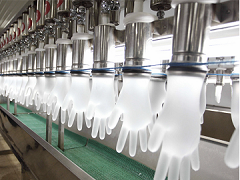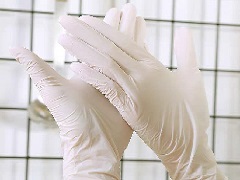Medical Antibacterial Gloves
Medical antibacturial gloves are made of rubber materials or synthetic polymers, such as latex, vinyl, neoprene or nitrile. Medical antibacturial gloves are used in medical Settings to reduce hand contamination, cross-contamination, and to protect patients and doctors from bacteria. Gloves are almost always disposable for safe handling and unique use. Also, medical gloves come in two varieties: one is made from cornstarch powder to ensure ease of use, and the other is unpowdered. During surgical procedures, hospitals generally use unpowdered medical gloves due to the safety and hygiene issues.

Medical staffs often come into contact with germs and microorganisms at work. They will be infected by bacteria or spread to other patients, causing cross-infection. Medical antibacterial gloves can kill bacteria, not only protect the health of medical staffs, but also prevent the spread of germs. Medical antibacterial gloves can be made in a variety of ways:
- Antibacterial surface coating, a mixture of water-soluble polyurethane resin;
- Add fungicides directly to latex;
- Soak the molded gloves directly in sterilizing liquid (011% ~ 110%), dry them for 30min, and control the temperature at 40 ~ 50℃.
General Standard for Medical Antibacterial Gloves.
Medical antibacturial gloves should be selected based on daily habits, type of procedure, hand size, use time, working style or personal habits. The usual criteria are shown below:
| Type | Powderd/Unpowdered |
|---|---|
| Options | Sterile |
| Material | Latex/Vinyl/Neoprene/Nitrile |
| Width, mm | 76/83/89/95/102/108/114 |
| Tolerance, mm | 6 |
| Length, mm | 230 |
| Thickness, mm, min | Finger(0.05)/Palm(0.08) |
| Color | Blue/White/Green |
| Tensile Strength, Mpa, min | 11 |
| Ultimate Elongation, %, min | 300 |
Testing for Medical Antibacterial Gloves
- Sterility Test: Sterility tests should be performed in accordance with the latest edition of the United States pharmacopoeia.
- Freedom from Holes: The no-hole free test shall be conducted in accordance with test method D 5151.
- The medical antibacterial gloves shall be subjected to accelerated aging test in accordance with test method D 573, and the gloves shall be exposed to 70 t2C for 72 t2 hours. Antibacterial gloves should stand up to these conditions without any sign of stickiness, exudation, or other deterioration.







